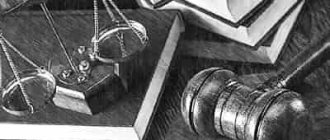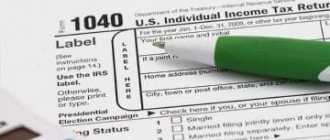What is arrears?
According to the Tax Code, arrears are taxes or mandatory payments that have not been paid.
Simply put, it is debt. Arrears are collected from both individuals and legal entities. The funds paid are sent to the state budget.
Tax arrears
Tax payments require a set date for payment. If the company does not make payments, then arrears are accrued. Charges are generated from the next day after the delay. The penalty is accrued daily until the date of payment of the debt and penalties.
If the debtor does not pay the debt in full, a fine is collected by force. That is, through the court. The debt amount is written off from bank accounts. If there are no funds, the property is seized.
If a lot of time has passed, no coercive measures apply to the debtor, and the debt is considered uncollectible. In this case, it is written off.
IMPORTANT! Refunds from the tax authority for overpayment of taxes can lead to the formation of arrears.
Arrears on insurance premiums
There are the following types of arrears in insurance premiums:
- According to the FSS. Occurs when there is a debt to the Social Insurance Fund. There is a certain procedure for calculating the amount of arrears: contributions already paid are deducted from the total amount of debt. From the amounts allocated to the Social Insurance Fund, the state forms a budget for benefits.
- In the Pension Fund. The debt is formed from mandatory pension payments.
- In FFOMS. The debt is formed from mandatory payments for medical care.
The presence of debt involves the accrual of penalties at a rate corresponding to the current rate of the Central Bank of the Russian Federation. An enterprise that has employees must pay contributions by the 15th day of the month following the reporting month.
https://youtu.be/AoWZELcCX9s
Position of the RF Armed Forces
In the Determination of the Judicial Collegium for Economic Disputes of the Supreme Court of the Russian Federation dated November 22, 2018 N 306-KG 18-10607 in case N A 65-26432/2016, the issue of debt write-off was considered in accordance with the provisions of Art. 12 of Federal Law N 436-FZ. The Supreme Court of the Russian Federation expressed its understanding of what this law represents. And this opinion is the following.
It does not follow from the content of Article 12 of Law N 436-FZ that this provision is an act of forgiveness of tax debts (tax amnesty), terminating, in accordance with subparagraph 5 of paragraph 3 of Article 44 of the Tax Code, the obligation to pay taxes, penalties and fines.
On the contrary, the provisions of this article are formulated as establishing special grounds for writing off debt, the right to collect which has not been lost by the tax authorities, and the legislator considers the mere fact of its non-payment within three years (2015 - 2020) as a sign that the debt is hopeless for collection. .).
Unlimited time-limited exposure of taxpayers to the risk of enforcement measures is burdensome for citizens (individual entrepreneurs) and further maintenance of this situation is recognized by the state as inappropriate. It is assumed that the reasons why measures for forced collection of tax debt did not lead to its repayment are due to circumstances that arose among citizens (individual entrepreneurs) that do not allow them to fully fulfill the obligation to pay taxes for a long period, and not due to concealment of information about unpaid taxes from the tax authorities, as well as concealing property from foreclosure.
Taking into account the above, for the purposes of Article 12 of Law N 436-FZ, the debt of citizens (individual entrepreneurs) subject to write-off, incurred as of 01/01/2015, should be understood as tax arrears, as well as penalties and fines known to the tax authorities and subject to collection at that time time, but not repaid in full or in the relevant part during 2020 - 2017.
Consequently, tax arrears, arrears of penalties and fines can only be written off from persons who declared them before 01/01/2015, or from persons whose tax arrears were identified (accrued) by the tax authorities before that day, but were not collected at the time of entry into force. force of Law N 436-FZ, that is, as of December 28, 2017.
This interpretation expresses an important law enforcement feature of Federal Law N 436-FZ.
How is arrears identified?
Arrears, in most cases, are identified as follows:
- A tax return is prepared.
- Tax is calculated.
- If the tax is not paid on time, arrears arise.
- The amount of the penalty is formed.
Arrears may be discovered as a result of a tax audit.
Found under the following obligations:
- Incorrect preparation of payment documents, as a result of which the money was not received by the creditor.
- Errors that appeared during calculations.
The owner of the enterprise can find the arrears during the process of checking documents. In this case, he must make the payment immediately.
Collection procedure
Forcible collection occurs if the debtor refuses to pay them voluntarily.
The creditor himself does not have the right to take coercive measures against the debtor. This is done exclusively through the court.
You cannot go straight to the judiciary. You must first try to solve the problem out of court. To do this, the debtor is first sent a demand for voluntary payment of the debt, which includes the accrued penalty. The requirement is drawn up in the prescribed form. It is sent within 3 months from the date the debt arose. The demand is delivered in person. It can also be sent by registered mail. The document must indicate the following points:
- The time frame within which the arrears must be covered.
- The reasons on which the debt arose.
- The consequences that will be applied to the debtor if he does not pay the debt.
- Information from relevant laws.
The requirement may also not indicate deadlines. In this case, the debtor needs to repay the debt within 10 days.
If the debtor does not make any payments, the creditor has the right to go to court. After receiving the writ of execution, the production process begins. In the process, coercive measures are implemented:
- Write-off of funds from bank accounts in the amount of debt.
- Seizure of property.
- Ban on traveling abroad.
If a debt is not paid for a long time, it is considered uncollectible and is cancelled.
Features of calculating penalties
The penalty is calculated daily. Its size is determined as a percentage of the debt. For example, a person’s debt to the tax office is 1000 rubles. The penalty is set at 0.1%. The delay was 10 days. That is, the penalty will be 10 rubles. The arrears are determined based on the current Central Bank refinancing rate.
Accounting for penalties
How to record a penalty in accounting? There is no need to take into account the penalty in expenses, since it is unreasonable. Postings are used to reflect penalties in documents. To track penalties, you can create auxiliary subaccounts “Peni”. The amount of penalties is indicated in the “Losses” account.
When paying a penalty, two payment orders are issued. The documents are marked with different budget classification codes. These codes include 12 characters.
What is the procedure for collecting arrears by tax authorities?
Let's consider the procedure for collecting debt to the budget from a taxpayer step by step.
Step 1. If a tax arrears are detected, the tax authority must issue a demand to the debtor to pay taxes, penalties, fines, and interest within the following terms:
Step 2. The taxpayer must fulfill the requirement within the period specified therein (clause 6 of article 6.1, paragraph 4 of clause 4 of article 69 of the Tax Code of the Russian Federation). The minimum period within which he must meet the repayment of arrears on taxes, penalties, etc. is 8 working days from the date of receipt. If the debtor does not fulfill the demand, then:
To learn about from which taxpayer accounts debts on taxes and fees can be collected, read the material “From which accounts can tax authorities collect?” .
Step 3. If it is not possible to collect the debt at the expense of the debtor’s funds, then:
Read more about the collection procedure here.
Summary
Arrears are debts formed due to the fact that the enterprise does not make tax deductions, contributions to insurance funds, and the Pension Fund of the Russian Federation. Arrears are discovered during checks and errors in payment documents are discovered by the head of the company himself. Subject to recovery in court. First, the creditor sends a demand for payment to the debtor. If the debtor does not respond to the demands, the creditor has the right to appeal to a judicial authority. Collection occurs through withdrawal of funds from bank accounts and seizure of property.
This is interesting: Gas masks in the Budget Institution of Kosgu in 2019
Accrued arrears on insurance premiums posting
However, this in no way affects the accounting and postings that are compiled in the organization, and, therefore, the correspondence and rules for calculating contributions remain the same. New card for recording insurance premiums Interest rates When calculating insurance premiums, the following interest rates are taken into account:
- for pension insurance - within the limit of 22%, above the limit of 10%;
- for health insurance - 5.1%;
- for social insurance - within the limit of 2.9%, above the limit 0%;
- for accident insurance - from 0.2 to 8.5%; For disabled people, only 60% of the calculated insurance premiums is taken.
All calculated insurance premiums are reflected in account 69, only broken down by subaccounts. In addition, analytical records are also maintained for each employee individually.
Basics of accounting for insurance premiums and posting them
Peculiarities of reflecting tax penalties in accounting To display penalties in accounting, you can use two accounts - 91 or 99. To display accrued penalties, it is recommended to use account 99, which allows you to avoid a permanent tax liability, since when generating an income tax return, the accrued penalty for insurance contributions are not included in the calculation of the tax base. It is recommended to consolidate the use of account 99 in the accounting policy of the enterprise. List of possible entries for accrual of penalties for income taxes, VAT, personal income tax and insurance contributions Account Dt Account Kt Posting amount, rub.
Method number 1. Online service from the Federal Tax Service
The official website of the Federal Tax Service allows you to check the supplier’s debt to the budget without registration. To do this, just follow the link to the website, enter the organization’s TIN, and also indicate the verification code from the picture. The system allows you to quickly find out whether there are debts on taxes, fees and other tax obligations.
IMPORTANT!
The service operates in test mode, which means that the data in the information base is limited. The site provides information only about legal entities that owe more than 1,000 rubles to the budget. The database also contains information about unsubmitted reports for previous periods. In other words, if a participant has a debt of less than 1,000 rubles, then it will not be possible to find out the legal entity’s debt on the official website of the Federal Tax Service.
Accounting entries for arrears of insurance premiums
Corresponding sub-accounts can be opened for the account, characterizing the type of insurance contributions, including those related to pension, medical or social insurance. Accounts The credit of the account shows the debt of the business entity for transfers of insurance premiums, and the debit shows the amounts that the company transfers to the state budget.
- In this case, a credit balance is usually formed on the account, which shows how much insurance premiums the organization is obliged to transfer.
- There is also a debit balance when the company has transferred an excess amount of contributions or government agencies have a debt to the company.
The latter situation is especially common when interacting with the Social Insurance Fund, when the calculated amount of contributions is less than the benefits paid to employees.
Concept
Tax debt is a debt obligation that an entrepreneur has in the event of late payment of budget fees as part of his business activity.
It is important to constantly monitor the presence of outstanding budget debts , because in case of prolonged non-payment, the fiscal authorities may refer the case to the court, after which the debts, along with financial fines, will be collected by the executive service by seizing property, as well as writing off funds from existing bank accounts .
Constant monitoring of your financial activities, as well as control over the full repayment of budget fees within the framework of business activities, guarantees the avoidance of fines and penalties, as well as litigation with the tax authorities.
The difference between tax debt and arrears
The main difference between arrears and personal income tax debt is that the first concept seems narrower and means the amount of money that an enterprise or entrepreneur must pay as fees to the state budget. Also, arrears often imply the existence of unilateral obligations of a person to the state.
Debt as a concept is broader and more capacious. It may mean the presence of any debt obligations of one person to another, including to the fiscal authorities. In essence, tax debt is a budget fee or contribution that has not yet become arrears and the enterprise or entrepreneur manages to pay it on time.
There are two types of debt:
- Current. If there is such debt, no penalties or interest will be charged.
- Overdue. If we are talking about overdue budget debt, then in this situation it is most likely impossible to avoid paying penalties and fines.
Arrears on insurance premiums accounting
Account 91 is debited if the reporting for the year in which taxes have not been accrued has already been signed. Personal income tax has not been calculated D 73 (76) - K 68 Additional personal income tax has been accrued, which can be withheld from the income of an individual. If additional tax is assessed on payments in favor of: - employees - account 73 is debited; D 70 (76) - K 73 (76) Additional personal income tax is withheld from payments in favor of the individual. Insurance premiums are not accrued. D 20 (26, 44, 91) - K 69. Additional insurance premiums are accrued. The transfer of debt does not exempt the company from penalties for missing the period established by law. The amount of sanctions is calculated as a percentage of the amount of contributions payable. This figure is equal to 1/300 of the refinancing rate of the Central Bank of Russia in effect on the date of delay. From January 1, 2020, it is equal to 11%.
Postings for accrual of penalties for taxes and insurance premiums
Such situations include:
- suspension by court decision of all banking operations of the company;
- seizure of property belonging to the enterprise.
The amount of the fine determined by the formula is transferred in full on the same day as the overdue money. Fines of the Federal Tax Service and the Pension Fund of Russia Fines according to the Labor Code Fines in the Pension Fund of the Russian Federation Key Rate.
. Fines and Penalties for Taxes Accrual of Penalty Postings from October 1, 2017 From October 1, 2020, the rules for calculating penalties are changing. From this date, a new version of paragraph 4 of Article 75 of the Tax Code of the Russian Federation is in force. According to the new rule, the interest rate for calculating penalties will be doubled, i.e.
- 20 - Main production Account 20 “Main production” is intended to summarize information about the costs of production, the products (works, services) of which were the purpose of creating this organization. In particular, this account is used for...
- 26 - General business expensesAccount 26 “General business expenses” is intended to summarize information on expenses for management needs not directly related to the production process.
Possibility of debt write-off by the tax authority
Often, business managers, as well as individual entrepreneurs, are concerned with the question of whether the tax office can write off tax debts. In fact, it really is possible. So, for example, the write-off of tax debts of individuals and enterprises is often carried out by the state as part of such an amnesty.
When carrying out the next amnesty, within the framework of which the debts of individual entrepreneurs and enterprises will be written off, the decision to write off debts is made by the fiscal authority at the place of registration of the taxpayer.
Basic conditions
When conducting an amnesty, you should know when tax debts are written off and what conditions must be met for this.
The main condition for writing off tax debts is the date of their formation. For example, in 2020, debts are subject to write-off, the formation of which dates back no later than January 1, 2020 (3 years ago).
In other words, the tax amnesty in 2020 affects all debts under the simplified tax system, UTII, Unified Agricultural Tax, PSN, as well as personal income tax and VAT (in addition to import) for all persons working within the general tax system. This also includes all fines and penalties assessed by fiscal authorities for non-payment of budget payments and fees.
Since individual entrepreneurs are classified as individuals, a similar amnesty also applies to them.
Individuals do not need to independently contact the tax authorities in order to write off debts, fines and penalties for taxes, since this process is carried out automatically by the fiscal service.
Writing off tax debts is a procedure, the possibility of application of which was taken into account in the original version of Part 1 of the Tax Code of the Russian Federation, which came into force in 1999
Accrued arrears on insurance premiums posting
How are penalties collected and what will happen for late payment? Often, the policyholder ignores the notice of payment of debts. If a notice of the need to pay a fine was delivered to the enterprise, but the payment was not made, the amount is collected forcibly:
- a collection order is sent to the banking institution where the payer’s current account is opened (funds will be debited as they are received until the debt is repaid);
- bailiffs receive a ruling on the need to collect debt by seizing the payer’s assets and selling them;
- if the debt is registered with an individual (not an individual entrepreneur), a lawsuit will be filed against him in order to withhold funds from his assets, after which a bailiff will be involved in seizing the debt.
When insurance contributions are not made on time, the pension rights of insured citizens are violated.
When fines, penalties, penalties for receipt or payment are accrued, the moment of their reflection in accounting and tax accounting coincides. . . 1. Reasons for the occurrence of arrears in insurance contributions to the Pension Fund According to Law No. 212-FZ, the obligation is considered fulfilled:
- from the moment a transaction related to the transfer of money to the relevant authorities is reflected in the enterprise’s account;
- from the date of presentation to the bank of a properly executed payment order;
- from the date of the supervisory authority’s decision to set off previously overpaid amounts;
- from the moment of depositing cash into the bank's cash desk, the administration to repay the debt to the relevant fund.
That is, if an organization transfers money for March 2020 on April 18, the accounting service should send to extra-budgetary funds an amount equal to mandatory contributions increased by the amount of the penalty.
Arrears on insurance contributions to the Pension Fund, Social Insurance Fund, Federal Compulsory Medical Insurance Fund: calculation of penalties." Posting penalties to the Pension Fund of the Russian Federation (to the Federal Tax Service): when to make the posting The day on which transactions to accrue the amount of penalties should be reflected is selected depending on whether the accountant paid the penalties himself or whether the obligation to pay them was discovered after an audit:
- when the accountant himself corrected the error and paid the penalty, the transactions are posted on the day of their calculation (and the day must be indicated in the calculation certificate);
- if a notice was received to remind you to pay penalties, the accountant makes an entry for the day when the decision to accrue them after the audit came into force.
Legislative acts on the topic It is recommended to study in advance: Document Title Federal Law of July 24, 1998 No. 125-FZ “On Compulsory Social Insurance” Norms for insurance premiums in cases of injury p.
Recognition of arrears as hopeless
Existing judicial practice shows that in the field of payment of tax payments, there are cases that are considered on an individual basis. Usually they make it clear that the tax debt was formed by the tax authority illegally and without reason.
If a citizen believes that such a case happened to him, then he has the right to resolve this issue in court and recognize the arrears as hopeless.
The legislation regulates exceptions when tax debts can be considered hopeless:
These points are reflected in the Tax Code, namely in Articles 14, 15, 59.
Required documents
In order to recognize the arrears as hopeless, a mandatory condition is to contact the judicial authority with the provision of a statement of claim and documents that confirm the validity of the plaintiff’s claims.
When filing a claim in the absence of legal knowledge and experience, individuals and legal entities usually trust lawyers and attorneys. A competent specialist, having the appropriate education, can easily help you draw up a statement of claim, provide advice on existing issues, and also protect the interests of the plaintiff in court.
Each statement of claim is submitted to the judicial authority along with copies of documents confirming the veracity of the circumstances of the case under consideration. They may be:
The list of documents is applied depending on the citizen’s situation and the circumstances due to which the arrears must be recognized as hopeless.
Accounting for tax penalties
The definition of a tax penalty can be found in Art. 114 Tax Code of the Russian Federation. According to the provisions of the Tax Code, a fine belongs to the category of tax sanctions. It is applied in the event of a tax offense and is calculated in monetary terms.
The amount of the fine depends on the type of violation (Chapter 16 of the Tax Code of the Russian Federation). The most common tax penalties that an accountant faces are fines for late payment of taxes and submission of reports.
For example, if a VAT return is submitted later than the deadline, the company will face a fine of 5 to 30% of the tax amount specified in the return. In this case, the minimum fine will be 1000 rubles (Article 119 of the Tax Code of the Russian Federation). And if the accountant forgot to transfer the tax, you will also have to pay a penalty for each day of delay.
All tax fines are imposed on the basis of a decision of the Federal Tax Service and are subject to payment by the guilty organization, and not by the official. Sometimes reporting fines are withheld from the salary of the performer (for example, the chief accountant) - such actions must be enshrined in local regulations (in the regulations on wages, in the procedure for bonuses to employees, etc.).
Fines are reflected in the debit of account 99 and the credit of accounts 68 or 69. For detailed analytics, you can open additional sub-accounts to account 68 by type of tax. For example, account 68 subaccount “VAT fines”. Such analytics will allow the accountant to track which taxes have already been paid.
Debit 99 Credit 68 - tax penalty accrued.
Debit 68 Credit 51 - tax penalty transferred to the Federal Tax Service.
Debit 99 Credit 69 - a fine has been accrued for insurance premiums.
The amounts of tax sanctions do not reduce taxable profit (clause 2 of Article 270 of the Tax Code of the Russian Federation).
Results
It is possible to guarantee that the company’s arrears will not be recovered from the director only in one case: if it did not arise in connection with the director’s deliberate evasion of paying taxes. 3 Resolution of the Plenum of the Supreme Court dated December 28, 2006 No. 64. That is, when he, in particular, did NOT deliberately understate revenue in the declaration, did NOT involve one-day companies with which he was associated in the work, and so on. Simply put, the tax debt arose due to different interpretations of ambiguous tax codes between the company and the Federal Tax Service, or due to a “bona fide” mistake by the company.
Otherwise, the director must understand that he may not only be convicted of a tax crime, but also be required to pay off the organization’s multimillion-dollar arrears. Moreover, according to subjective feelings, in such disputes judges more often support tax authorities.
It is absolutely indisputable that the Federal Tax Service Inspectorate can transfer the company’s tax debts to the director as part of a bankruptcy case, proving in arbitration that the organization is not able to pay the budget due to the fault of the director. However, tax authorities extremely rarely use this legal instrument, preferring a simpler mechanism for recovering damages in civil proceedings, approved by some courts of general jurisdiction. 10 of the Law of October 26, 2002 No. 127-FZ; Appeal ruling of the Irkutsk Regional Court dated December 30, 2014 No. 33-10824/2014.
Arrears on tax payments arise if the deadlines for payment are missed. It is recognized from the first day following the date determined as the deadline for payment. The consequence is penalties accrued for each day of delay.
If the taxpayer does not pay off the arrears and penalties voluntarily, the Federal Tax Service will resort to a forced collection procedure. In certain situations, debt is considered uncollectible.
How to account for tax penalties
Penalties are not tax sanctions, and therefore we will consider their accounting separately.
A penalty is an amount of money that a company (IP) must pay to the budget if taxes (contributions, fees) are not paid on time (Article 75 of the Tax Code of the Russian Federation).
Penalties are accrued for each calendar day of delay in fulfilling the obligation to pay a tax or fee, starting from the day following the day of payment of the tax or fee established by law. If the tax payment deadline falls on January 25, then penalties must be accrued from January 26.
The penalty for each day of delay is determined as a percentage of the debt. The interest rate of the penalty is 1/300 of the current refinancing rate. The refinancing rate is equal to the key rate; as of March 1, 2017, it is equal to 10% (Information of the Central Bank of the Russian Federation dated September 16, 2016).
Penalties = Amount of tax not paid on time x Number of calendar days of delay x 1/300 of the refinancing rate.
From October 1, 2017, penalties will be calculated based on 1/150 of the refinancing rate if the delay in payment exceeds 30 days (Federal Law of November 30, 2016 No. 401-FZ).
In practice, penalties are taken into account in different ways: some experts attribute tax penalties to account 91, while others - to account 99. Not a single regulatory act gives a clear answer on which account penalties should be taken into account. The decision must be made independently and consolidated in the accounting policy of the enterprise.
Option No. 1. Penalties are taken into account on account 91
If you read the definition of penalties, you can conclude: penalties do not relate to tax sanctions, and therefore cannot be taken into account on account 99. The characteristics of account 99 are presented in the chart of accounts and literally read as follows: “account 99 reflects the amounts of accrued conditional expenses for income tax, permanent liabilities and payments for recalculation of this tax from actual profit, as well as the amount of tax penalties due.” There is no talk of penalties here.
Since penalties are not taken into account for tax purposes (clause 2 of Article 270 of the Tax Code of the Russian Federation), only account 91-2 remains for their accounting. However, the chart of accounts explains that under account 91 only penalties for violation of contractual terms can be taken into account. The list of expenses is disclosed in PBU 10/99, and among those listed there are also no tax penalties. But in PBU 10/99 there is an article “other expenses”, and penalties can be attributed to it. The main thing is to fix the reflection of penalties on account 91 in the accounting policy of the organization.
Taking into account the penalties on account 91, a permanent tax liability will have to be accrued (PBU 18/02).
The accountant made the following entries:
Option No. 2. Penalties are taken into account on account 99
It is much more convenient to take into account penalties on account 99. Then the accountant will not have to accrue PNO.
In the instructions for using the chart of accounts, neither account 91 nor account 99 is directly suitable for accounting for penalties. However, in its economic content, the concept of penalties is very close to tax sanctions that must be taken into account in account 99. Transactions in accounting must be reflected based on their economic content , which takes precedence over the legal status of the operation (clause 6 of PBU 1/2008).
Example. received a request to pay interest on income tax in the amount of 421 rubles. The organization records penalties on account 99.
The accountant made the following entries:
Regardless of the chosen option for reflecting penalties, you must remember that penalties do not reduce profits for tax purposes. In the financial statements, penalties are reflected depending on the selected accounting account. Ultimately, the net profit will be the same for any option for accounting for penalties. If the amount of penalties is significant, it is advisable to disclose information about it in an explanatory note.
Penalties on the first payment are calculated for 64 days (from January 26, 2017 to March 30, 2017).
Penalties for the second payment are calculated for 31 days (from 02/28/2017 to 03/30/2017).
Penalties for the third payment are calculated for 3 days (from 03/28/2017 to 03/30/2017).
You can calculate penalties online using a calculator.
Information letter from the Federal Tax Service
In connection with the publication of the law, the Federal Tax Service of Russia issued an information letter dated March 20, 2018 containing the following clarification.
Work to write off debt is carried out by tax authorities in several stages. As of March 1, 2018, the main work on writing off the debt of individuals for property taxes and the debt of individual entrepreneurs for taxes related to business activities has already been completed.
Currently, work to write off debt by tax authorities continues.
Debt is written off by the tax authorities independently, without the participation of the taxpayer. Additionally, there is no need to contact the tax authorities.
Tax arrears - what is it?
A situation in which an individual or legal entity has not fully fulfilled its obligations as a taxpayer and has not paid all taxes established by law on time is a tax arrears.
Arrears in personal income tax and other taxes and fees are almost always discovered during an audit by the tax authorities.
Tax arrears can arise in various ways. Most often such situations occur in the following cases:
- Late payment of tax. As soon as the tax payment deadlines have been violated, at that moment the arrears in question already arise.
- Incomplete payment of tax. If the tax was paid on time, but not in full, including due to an accounting error, an arrear arises that must be eliminated.
- Complete non-payment of tax. If the taxpayer fails to pay the tax in principle, this is also considered a tax arrears.
- Excessive tax refund. For some types of tax, a refund is provided, for example when working with VAT. In some cases, the refund may be excessive, and then it also causes arrears.
For each day of delay in tax payment, the legislation provides for the possible application of various penalties to an individual or legal entity and the daily accrual of penalties. In order for the arrears to be considered fully repaid, the debtor must pay both tax on the full amount of the arrears and additional funds accrued to the debt.
The procedure for collecting arrears is quite simple and includes three stages, which include:
- Sending the debtor demands for tax payment, as well as all additional penalties, interest and fines. Such a referral is submitted within 20 days from the moment the arrears are discovered during a tax audit. In the case where the discovery of arrears was not associated with control activities, this period increases to 3 months if the arrears amounted to more than 500 rubles, and 1 year if the amount of arrears is less than this amount.
- The debtor is given time to comply with the requirements of the tax authority, which cannot be less than 8 days. If the debt is not repaid within this period, then the debt will be repaid automatically from the debtor’s accounts.
- This stage begins if there were no funds in the debtor’s accounts to repay the arrears or there were insufficient funds. In this situation, the tax inspectorate submits an application to the arbitration court to collect the debt. If it cannot be collected even with the help of the court, then the inspectorate may make a decision to collect the debt at the expense of the debtor’s property.
Responsibility
In case of systematic non-payment of taxes
The Tax Code provides for the following types of liability for arrears of funds as taxes:
- a penalty expressed in the requirement to pay 20% of the debt amount. It is applicable in accordance with Article 122 of the Tax Code if a citizen deliberately understated the tax base (recorded in a tax return an amount less than what he actually receives). This type of liability applies only to an incorrectly completed tax return submitted to the inspector later than the deadline. Payment of these funds does not relieve the debtor from paying the arrears;
- a penalty, expressed in the requirement to pay 5% of the debt amount, is valid in the absence of a declaration to the tax office within the established time frame.
- a penalty is accrued if a citizen or enterprise submits a declaration on time and is correctly completed, but the tax is not paid.
The Criminal Code outlines the following types of liability for arrears:
- a person evades paying taxes and fees, or commits arrears on a large scale, he may be subject to a fine. It is expressed in the payment of an amount of money from 200 thousand rubles. up to 500 thousand rubles. Alternative options at the discretion of the judicial authority include arrest of wages for 3 years, forced labor for the same period, as well as imprisonment for up to 3 years (Article 198 of the Criminal Code);
- the person does not submit a tax return to the inspectorate, or records false information in it, evasion of payment is committed on a large scale. For such actions, a fine may be imposed in the amount of 100 thousand rubles. up to 300 thousand rubles. Other methods of holding them accountable may be: seizure of wages for 3 years, involvement in forced labor with removal from certain official posts for up to 3 years. The heaviest types of liability are arrest for up to 6 months, serving a sentence in places of general regime for up to 3 years (Article 199 of the Criminal Code).
These articles talk about the large scale within which the crime was committed; it is necessary to analyze what it includes.
A large amount is understood as the total amount of unpaid taxes, which:
- amounts to more than 5 million rubles, accumulated over 3 consecutive years. The condition is stipulated that the amount of taxes payable is greater than 25% of the amount fixed for payment;
- amounts to more than 15 million rubles.
A particularly large amount is considered to be arrears in the amount of more than 15 million rubles. The condition is stipulated that the amount of taxes payable is greater than 50% of the amount fixed for payment
IMPORTANT: The application of the type of liability to the debtor is regulated during the trial and depends on the circumstances due to which the law was violated.
Citizens who are brought to criminal liability for tax arrears for the first time are treated more favorably by the court. He may be released from criminal liability if the individual has paid all tax arrears, as well as penalties accrued for arrears.
Not only legal entities, individuals, and entrepreneurs bear a certain responsibility, but also tax agents who allow improper performance of their official duties, giving priority to personal interests.
When can tax arrears be written off?
Current legislation provides for situations in which tax arrears may be written off. In this case, the debtor will still be considered to have a debt, but it may become uncollectible and, accordingly, no additional sanctions or restrictions will be applied to the debtor for its existence. In particular, tax arrears are considered uncollectible if the debtor:
- It is a liquidated organization.
- He was declared bankrupt in accordance with the procedure established by law.
- He was an individual and died.
- He received a court decision according to which the arrears could not be collected from him.
- He turned to the bailiffs with a request to close the proceedings on the basis that the amount of arrears was insufficient to begin bankruptcy proceedings or if the court refused to recognize bankruptcy due to lack of funds to pay legal costs.










